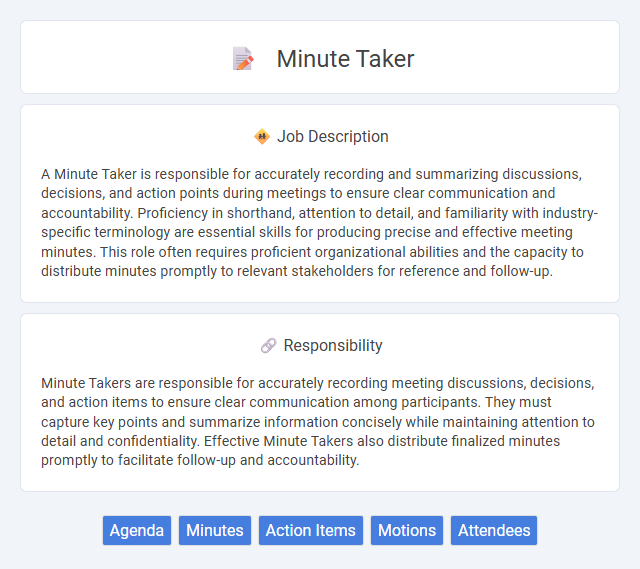
A Minute Taker is responsible for accurately recording and summarizing discussions, decisions, and action points during meetings to ensure clear communication and accountability. Proficiency in shorthand, attention to detail, and familiarity with industry-specific terminology are essential skills for producing precise and effective meeting minutes. This role often requires proficient organizational abilities and the capacity to distribute minutes promptly to relevant stakeholders for reference and follow-up.
Individuals who are detail-oriented and have strong listening skills are likely to be well-suited for a Minute Taker role. Those who prefer environments requiring concentration and accurate documentation may find this job aligns with their strengths, while people who struggle with focus or fast-paced communication might face challenges. Effective communication skills and the ability to summarize discussions efficiently are probable necessities for success in this position.
Qualification
A Minute Taker typically requires excellent listening and typing skills, with a strong command of grammar and punctuation for accurate transcription. Proficiency in recording software, shorthand, or note-taking techniques enhances efficiency, while experience in business or administrative environments supports understanding of meeting contexts and terminology. Certification in business administration or specific training in minute-taking can boost employability and performance quality.
Responsibility
Minute Takers are responsible for accurately recording meeting discussions, decisions, and action items to ensure clear communication among participants. They must capture key points and summarize information concisely while maintaining attention to detail and confidentiality. Effective Minute Takers also distribute finalized minutes promptly to facilitate follow-up and accountability.
Benefit
Minute taker roles likely offer benefits such as improved organizational skills and enhanced attention to detail, which can increase job efficiency. There is a strong probability that working in this capacity improves communication abilities by summarizing and clarifying meeting discussions. These advantages may lead to better career prospects in administrative and managerial positions.
Challenge
Minute taker roles likely present the challenge of maintaining accuracy and clarity under pressure, especially during fast-paced meetings with multiple speakers. It is probable that capturing essential details while filtering out irrelevant information demands high-level listening and typing skills. The job may also require adaptability to different meeting formats and the ability to produce organized, comprehensive records promptly after discussions.
Career Advancement
Minute takers gain valuable skills in organization, active listening, and communication, which are essential for career progression in administrative and managerial roles. Mastery in accurate documentation and meeting coordination can lead to opportunities such as executive assistant, office manager, or project coordinator positions. Developing expertise with digital tools and understanding business processes further enhances prospects for advancement in corporate or governmental environments.
Key Terms
Agenda
Minute Takers play a crucial role in documenting meetings by accurately capturing the agenda topics discussed, ensuring clear and organized records. They focus on outlining each agenda item, noting key decisions, action points, and responsible parties. Precision in recording the agenda helps streamline follow-ups and supports effective communication within organizations.
Minutes
Minutes accurately capture key decisions, action items, and discussions from meetings, ensuring clear communication and accountability. Minute takers must demonstrate strong listening, shorthand, and summarizing skills to produce concise, coherent, and error-free records. Effective minutes support project tracking, regulatory compliance, and stakeholder alignment.
Action Items
Minute Takers are responsible for accurately documenting meetings, with a strong emphasis on capturing action items, deadlines, and assigned individuals. Precise recording of action items ensures clear accountability and helps track progress against organizational goals. Effective minute taking facilitates follow-ups and drives timely completion of tasks within teams.
Motions
Minute takers document motions accurately during meetings, capturing precise wording, proposer names, and outcomes to ensure legal and procedural compliance. Clear recording of motions supports efficient decision-making, provides an official record for future reference, and aids in tracking action items. Proficient minute takers utilize standardized templates and abbreviations to enhance clarity and streamline the review process.
Attendees
Minute Takers play a crucial role in documenting the contributions and decisions of meeting attendees, ensuring accurate representation of each participant's input. Effective Minute Takers capture attendees' names, roles, and key points discussed, facilitating clear communication and accountability. Precise records of attendees help organizations track participation and follow up on assigned tasks efficiently.
 kuljobs.com
kuljobs.com